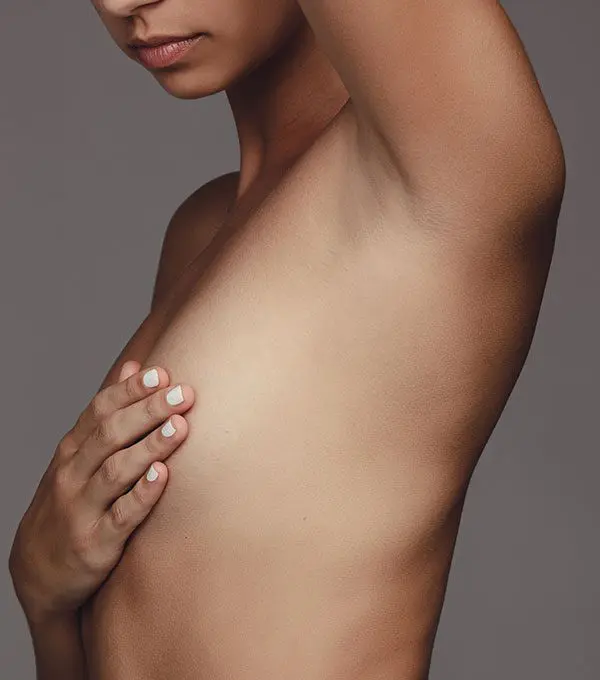



What do our clients think? Average 5 out of 5 based on 1 reviewRead all reviews
Following your breast surgery you will stay in hospital for 5-7 nights.
Once you are discharged from hospital, you will need to wear a sports/support bra, provided by botonics, and it is recommended that you wear this regularly day and night in order to support your breasts.
You must keep your wounds and dressings dry for the first week while you are at home. If dissolvable stitches have been used, these normally dissolve on their own accord within four to eight weeks. If you’ve had non-dissolvable stitches then you’ll need to return in 7 – 10 days after your procedure to have these removed.
It is important that you refrain from lifting your operated arm(s) above shoulder height, so as to protect the vascular anastomosis; the ‘plumbing’ of your new breast(s).
The next step in your aftercare plan will involve an exercise program under the care of a physiotherapist. The main objectives will be to regain and maintain full movement of your shoulder(s); encourage circulation and the healing of scar tissue; prevent or ease any back pain caused by the operation; improve spine mobility and rebuild your abdominal (stomach) muscle strength.
You must avoid heavy activities and any sudden or abrupt movements for the first eight weeks after your operation – your physiotherapist can advise you on this. Anything that can strain the abdominal muscles should also be avoided and all contact sports.
Gentle exercise such as walking is advised and this can help maintain fitness. It is normal to feel tired after surgery and it’s difficult to put a time on how long you will feel this way. Ask your doctor or physiotherapist for advice.
After eight weeks you can start building up to more advanced upper body and abdominal exercise, such as more active walking and using an exercise bike. Swimming is also great option, but not if you have any open wounds or are undergoing radiotherapy (due to the drying effects it has on your skin). Gradually build up your exercise tolerance, which your physiotherapist can advise you with.
You should refrain from driving for six to eight weeks. Before you start driving again, you must check with your doctor and also with your insurance provider to make sure you are covered. Additionally, it is important to only recommence driving once you feel confident to handle an emergency situation.
It is paramount that you avoid alcohol at least a week prior to your operation. This is in order to reduce the risks of complications, and increase your body’s chance of healing well. Two weeks after, and once your wounds have healed and medication course has stopped, it is safe to recommence alcohol if you wish to do so. It is also important that you refrain from using any painkillers such as aspirin or ibuprofen, as these can thin the blood and cause more bleeding. Appropriate painkillers and antibiotics will be provided by your surgeon.
Avoid smoking completely for 6 months before and 6 weeks after your surgery, this includes all form of nicotine as it will have an impact on the healing of your abdomen following your procedure. Nicotine is a vasoconstrictor meaning that it constricts the blood vessels.
Following the breast reconstruction surgery, the type of job that you do determines when you can return to work. It could be up to three months for full recovery. Your doctor or nurse will give you more specific advice.
You may experience changes in sensation over your breast and inner arm, such as numbness, tingling or the area(s) may be extra-sensitive. These sensations are normal and temporary. Gentle stroking and/or tapping the area may help to ease any discomfort. There is a chance, however, that some of the numbness may be permanent.
If you develop a seroma (fluid collection), do not worry – this is a normal part of the healing process, but if it is severe, it will need to be drained. Your surgeon will do this.
The scar will take time to mature. During the first six weeks the scar will pretty much look after itself. By week six, once your scar has healed, you should commence moisturising and massaging the scar using the palm of your hand or fingers, with E45 cream or other products that the nurse has advised. Move the top layer of skin on the underlying layers in a circular motion or away from the scar. The aim being to soften the scar and speed up final scar maturation. The delicate scar tissue is at greater risk of sunburn if exposed to the sun, therefore, you are advised to avoid sun exposure to any scar tissue for the first six weeks of healing, after this if the area is to be exposed to sunlight you should apply sun protection factor 15 or greater sun block to exposed scar tissue.
If you develop any of the following symptoms you should contact botonics:
Smoking, and passive smoking, must be completely avoided for at least 6 months before (and 6 weeks after surgery).
Blood tests and screening will generally be required before surgery and this will be discussed during your initial consultation. The main scan needed is a CT scan of the abdomen, to have a look at the blood vessels, which can be done locally (if you are from abroad).
It is important to inform us if you fall ill prior to your surgery (even if it is minor).
If you have any queries, questions or concerns regarding your procedure or recovery please feel free to contact botonics.
Treatment Summary
Procedure time
5 - 8 hours
Anaesthetic
General
Hospital stay
5 - 7 nights
Sensitivity period
2 months
Back to work
3 months
Duration of results
Permanent
Risks & complications
Scarring, bruising, swelling, infection, asymmetry, capsular contracture.
Location
Your Specialist(s)

